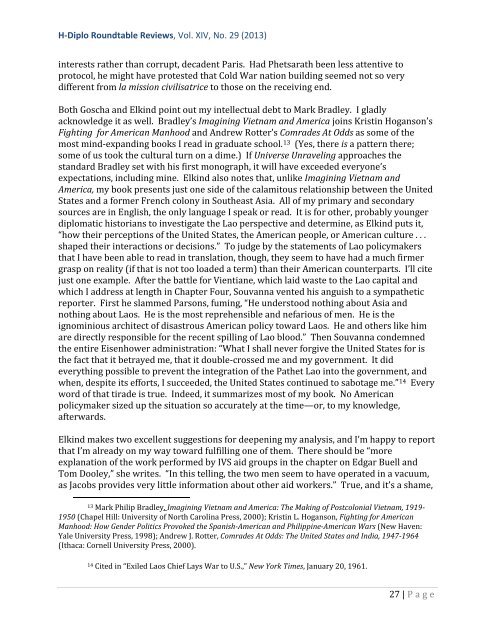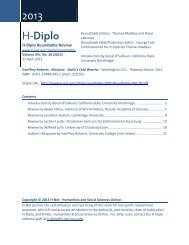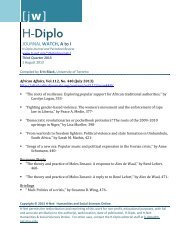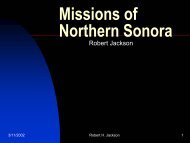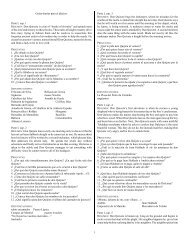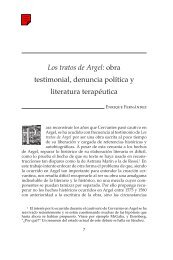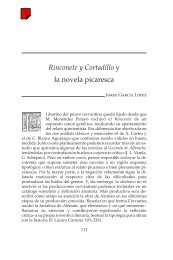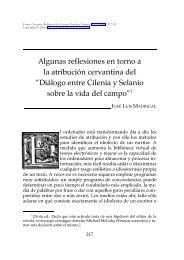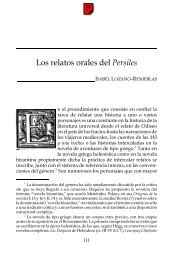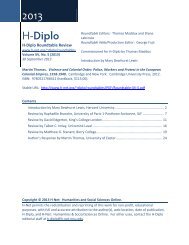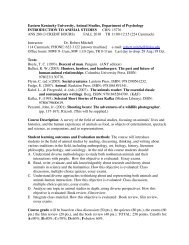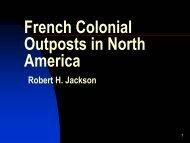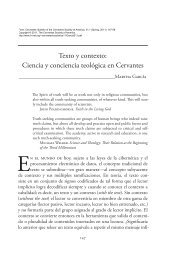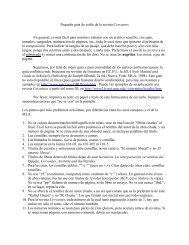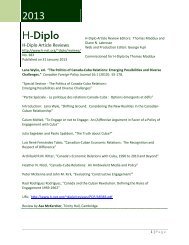H-Diplo Roundtables, Vol. XIV, No. 29 (2013) - H-Net
H-Diplo Roundtables, Vol. XIV, No. 29 (2013) - H-Net
H-Diplo Roundtables, Vol. XIV, No. 29 (2013) - H-Net
Create successful ePaper yourself
Turn your PDF publications into a flip-book with our unique Google optimized e-Paper software.
H-<strong>Diplo</strong> Roundtable Reviews, <strong>Vol</strong>. <strong>XIV</strong>, <strong>No</strong>. <strong>29</strong> (<strong>2013</strong>)<br />
interests rather than corrupt, decadent Paris. Had Phetsarath been less attentive to<br />
protocol, he might have protested that Cold War nation building seemed not so very<br />
different from la mission civilisatrice to those on the receiving end.<br />
Both Goscha and Elkind point out my intellectual debt to Mark Bradley. I gladly<br />
acknowledge it as well. Bradley’s Imagining Vietnam and America joins Kristin Hoganson’s<br />
Fighting for American Manhood and Andrew Rotter’s Comrades At Odds as some of the<br />
most mind-expanding books I read in graduate school. 13 (Yes, there is a pattern there;<br />
some of us took the cultural turn on a dime.) If Universe Unraveling approaches the<br />
standard Bradley set with his first monograph, it will have exceeded everyone’s<br />
expectations, including mine. Elkind also notes that, unlike Imagining Vietnam and<br />
America, my book presents just one side of the calamitous relationship between the United<br />
States and a former French colony in Southeast Asia. All of my primary and secondary<br />
sources are in English, the only language I speak or read. It is for other, probably younger<br />
diplomatic historians to investigate the Lao perspective and determine, as Elkind puts it,<br />
“how their perceptions of the United States, the American people, or American culture . . .<br />
shaped their interactions or decisions.” To judge by the statements of Lao policymakers<br />
that I have been able to read in translation, though, they seem to have had a much firmer<br />
grasp on reality (if that is not too loaded a term) than their American counterparts. I’ll cite<br />
just one example. After the battle for Vientiane, which laid waste to the Lao capital and<br />
which I address at length in Chapter Four, Souvanna vented his anguish to a sympathetic<br />
reporter. First he slammed Parsons, fuming, “He understood nothing about Asia and<br />
nothing about Laos. He is the most reprehensible and nefarious of men. He is the<br />
ignominious architect of disastrous American policy toward Laos. He and others like him<br />
are directly responsible for the recent spilling of Lao blood.” Then Souvanna condemned<br />
the entire Eisenhower administration: “What I shall never forgive the United States for is<br />
the fact that it betrayed me, that it double-crossed me and my government. It did<br />
everything possible to prevent the integration of the Pathet Lao into the government, and<br />
when, despite its efforts, I succeeded, the United States continued to sabotage me.” 14 Every<br />
word of that tirade is true. Indeed, it summarizes most of my book. <strong>No</strong> American<br />
policymaker sized up the situation so accurately at the time—or, to my knowledge,<br />
afterwards.<br />
Elkind makes two excellent suggestions for deepening my analysis, and I’m happy to report<br />
that I’m already on my way toward fulfilling one of them. There should be “more<br />
explanation of the work performed by IVS aid groups in the chapter on Edgar Buell and<br />
Tom Dooley,” she writes. “In this telling, the two men seem to have operated in a vacuum,<br />
as Jacobs provides very little information about other aid workers.” True, and it’s a shame,<br />
13 Mark Philip Bradley, Imagining Vietnam and America: The Making of Postcolonial Vietnam, 1919-<br />
1950 (Chapel Hill: University of <strong>No</strong>rth Carolina Press, 2000); Kristin L. Hoganson, Fighting for American<br />
Manhood: How Gender Politics Provoked the Spanish-American and Philippine-American Wars (New Haven:<br />
Yale University Press, 1998); Andrew J. Rotter, Comrades At Odds: The United States and India, 1947-1964<br />
(Ithaca: Cornell University Press, 2000).<br />
14 Cited in “Exiled Laos Chief Lays War to U.S.,” New York Times, January 20, 1961.<br />
27 | P age


